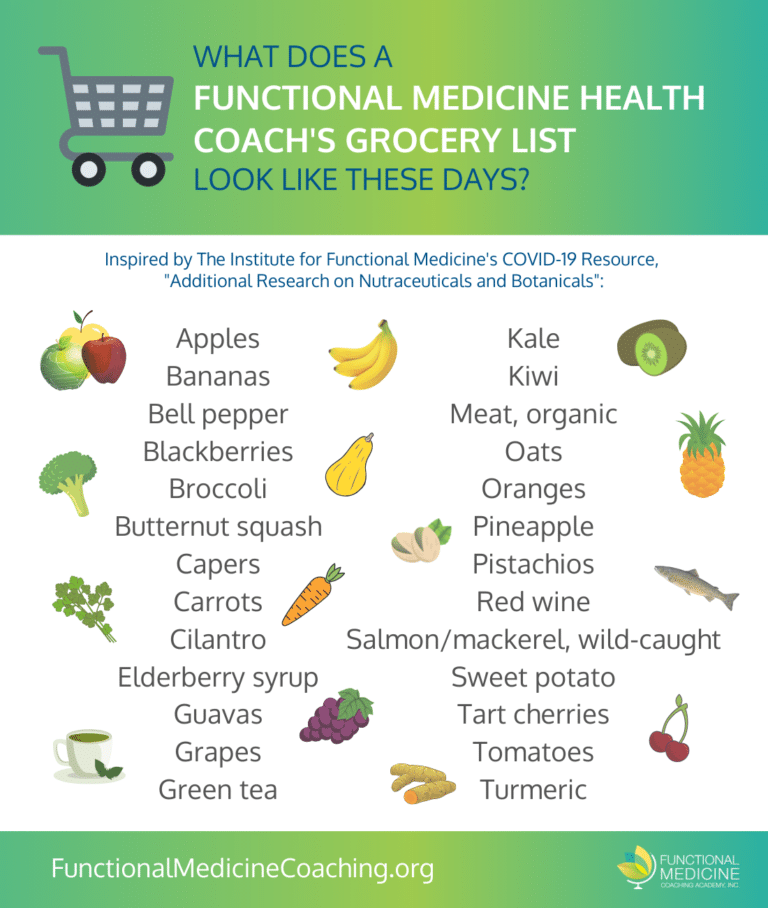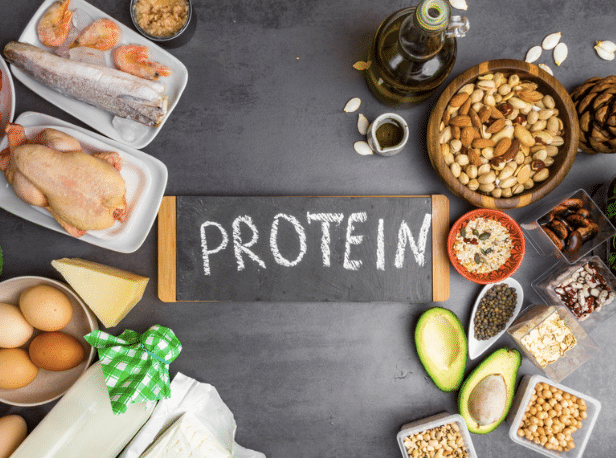Here in the US, we’re five months into the COVID-19 pandemic, with no end in sight. As both infection rates and guidelines for reopening look different depending on where you are in the country and the world, we must continue to give our bodies what they need to “be the worst possible host for the virus,” as Sandra Scheinbaum, PHD, IMCP, FMCA’s Founder & CEO, likes to say.
At the heart of this effort to give our bodies what they need is NUTRITION.
Functional Medicine focuses on the principle that food IS medicine, so naturally, nutrition is a critical factor in the Functional Medicine approach to COVID-19.
FMCA’s partner, The Institute for Functional Medicine (IFM), released a great COVID-19 resource that breaks down existing research on the impact and recommended use of nutraceuticals and botanicals—things you can add to your diet to shore up your immune defenses. Leading IFM researchers are updating and publishing their findings and recommendations as we learn more about the virus and as new research emerges.
In practice, doctors and health coaches are partnering to translate this kind of information into actions for patients and clients who are asking “what does my body need that it might be missing right now?” Nutraceuticals and botanicals are great, but the average shopper looking to add “quercetin” or “n-acetylcysteine” to their diet won’t find it on the shelf next to the peanut butter. What does it look like to translate and apply nutrition information to boost clients’ health and immunity?
This is where Functional Medicine Certified Health Coaches play a vital role: demystifying doctors’ health recommendations to make healthy nutrition accessible instead of intimidating.
Below, we’ve taken IFM’s findings and adapted them into an immune-boosting grocery shopping list. It outlines some whole-food recommendations that are beneficial to include in your diet at any time, and especially good at times when optimal immune health is a focus.
A Functional Medicine Health Coach’s Immune-Boosting Grocery List

- Fruits: Like apples, berries, broccoli, tart cherries, citrus fruits, guavas, grapes, pineapple, bananas, and kiwi
- Vegetables: Like kale, spinach, tomatoes, broccoli, cauliflower, carrots, asparagus, sweet potatoes, butternut squash, and peppers
- Healthy fats: Like avocados, olive oil, and coconut oil
- Seeds and nuts: Especially almonds, cashews, macadamia nuts, pistachios, pumpkin seeds, oats, sunflower seeds, natural peanut butter, and tahini
- Spices, herbs, and flavorings: Try to incorporate turmeric, cilantro, capers, cumin, basil, rosemary, black pepper, nutritional yeast, ginger, and pink salt
- Fermented foods: Especially yogurt, kefir, kimchi, miso, and sauerkraut
- Animal protein: Try for organic meat, pasture-raised eggs, and wild-caught fish when possible
- Beverages: Especially green tea, matcha, echinacea tea, kombucha, and red wine (in moderation, of course)
Boosting Your Immune System: Considerations From A Functional Medicine Perspective
Food matters because the gastrointestinal tract is responsible for immune system activity. That’s why it’s so important we keep the gut happy and nourished with the nutrients necessary to maintain a healthy gut microbiome.
While everyone may not have access to all of these foods every day, the good news is that you can’t go wrong choosing whole, unprocessed, and plant-based options. If you’re not sure where to start, just start there!
Here are some tips that a Functional Medicine Health Coach might recommend to help you get on the right path:
- Eat the rainbow, because every color of food contains different phytonutrients that our bodies need to thrive. Phytonutrient-rich foods boost your body’s reserves of antioxidants and anti-inflammatory agents. From red tomatoes to purple grapes, try to eat a little bit of every color, every day.
- Add dietary fiber, preferably from whole, plant-based foods like avocado, apples, and broccoli. These can boost your body’s production of anti-inflammatory proteins.
- Try fermented vegetables or other probiotic-containing foods to maintain health and gut barrier functions. Don’t be scared of a little fermentation – your body will love you for it!
- Avoid immune offenders that can stifle your immune response, like added sugars, excessive salt, processed carbohydrates, and saturated fats.
Immune- and Gut-Friendly Foods Forever
These foods may be extra impactful right now, but they’ll never go out of style. Whole foods like the ones listed here will serve your gut far beyond the COVID-19 crisis—but only if you make them part of your daily routine.
The key for immunity is not just a short-term switch to diverse whole foods but a commitment to feeding your gut microbiome for the long haul. That’s where Functional Medicine Health Coaches really shine: helping clients incorporate changes into their lives in a way they can sustain for the long term. With a coach, you’ll find and create recipes, start new habits, and—perhaps most important of all—tap into the motivation to ensure these healthy changes become part of your daily, healthy life.
Our Latest Blogs
-

Would You Be a Good Health Coach?
Read Full Article: Would You Be a Good Health Coach? -

Food Sensitivity Testing 101: Supporting Clients with Inflammation and Gut Issues
Read Full Article: Food Sensitivity Testing 101: Supporting Clients with Inflammation and Gut Issues -

Protein 101: The Health Coach’s Guide
Read Full Article: Protein 101: The Health Coach’s Guide

